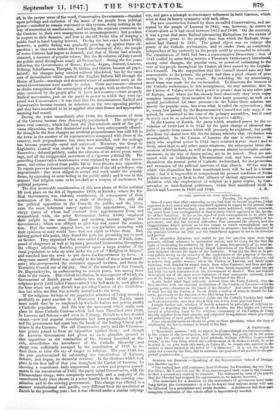TO THE EDITOR OF THE SPECTATOR.
Tuesday, 7th September 1847. SIR—I regret that after expressing, as you had done on former occasions, (what appeared to me) sound and well-considered opinions in regard to the present state of public affairs in Switzerland, you should have published, without oomment, the letter from your correspondent in that country which appeared in the Special- tor of last Saturday. So far as the object of your correspondent is to show the defective character of the present Swiss Compact, and its susceptibility of im- provement, and also the natural difficulties that surround the subject, and the exaggerations which prevail as to the extent to which centralisation can be carried, his remarks are judicious and entitled to attention; but his statement of the question between the Diet and the Sonderbund appears to me to be defective and partial.
It is altogether fallacious and unfair to put the question upon mere] grounds, without reference to antecedent events, and to claim for the Diet the right of vindicating its authority by force of arms irrespectively of its totals's- glect of its obvious duties on former illegal infractions of the Federal law, when such injustice affected the rights of the minority. What did the Diet do to pre- vent public wrong on the occasion of the confiscation of the property of the con- vents in the Canton of Aargau? What did it do to vindicate its authority, and to redress deep .public wrongs, when the Canton of Lucerne, and lately again Fribourg, were Invaded by armed bands from other Cantons; and lives and pro-. party sacrificed in the contest? Were not these bands organized under the eye and with the tacit concurrence of the Government of .Berne? Was not Colonel Ochsenbein one of the most active fomenters of that outrageous outbreak, if not one of its leaders; and is he not now the President of the Diet? Again, uuder what legal authority, derived from the Pacte Federal, does the Diet interfere with the cantonal institutions of the Canton of Lucerne—withka placing public education in the hands of the Jesuits? And under the authority of what law did the Canton of Tessin detain a convoy of arms in transit for Lu- cerne, previously to the decision of the Diet being known ? To what security for their cantonal rights can the Catholic Cantons look under such circumstances, save that which they can derive from physical force?
I might further ask, whether, if merely actuated by principles of religious to- lerance in requiring the expulsion of the Jesuits, the Diet might not breve ex- tended a protecting hand to the religious community of the Canton de Vaud, forcibly expelled from their chapels, and subjected to regulations which practically are prohibitory of their public worship?
Some reasonable answers should be given to these questions, when the duty of vindicating the law is claimed in behalf of the Diet.
[" Reasonable answers" will, we expect, be given—though not controversially— in the course of the investigation' still uncompleted, but going on in our pages. To "put the question on mere legal grounds, without reference to antecedent events," is the very thing which our correspondent A. B. wishes toavoid. In order to avoid it, he goes back this week, in Letter II., to events even anterior tathe earliest of those noticed in the letter of "A Genevese." It is not his object :to make out a case for the Diet, but. to ascertain the position of all parties in thoper- plexed quarreL—En.]


























 Previous page
Previous page